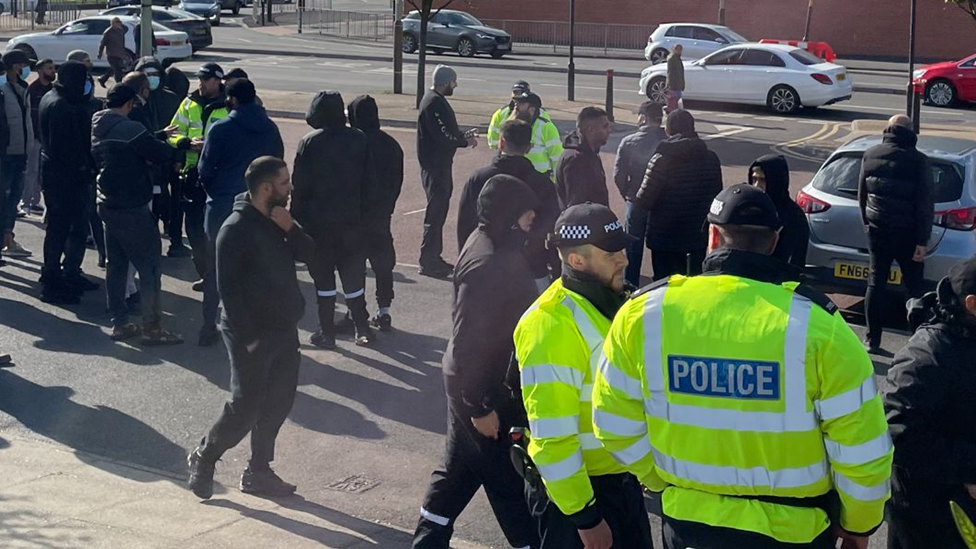Leicester disorder: Fear lingers among city's Muslims and Hindus
- Published
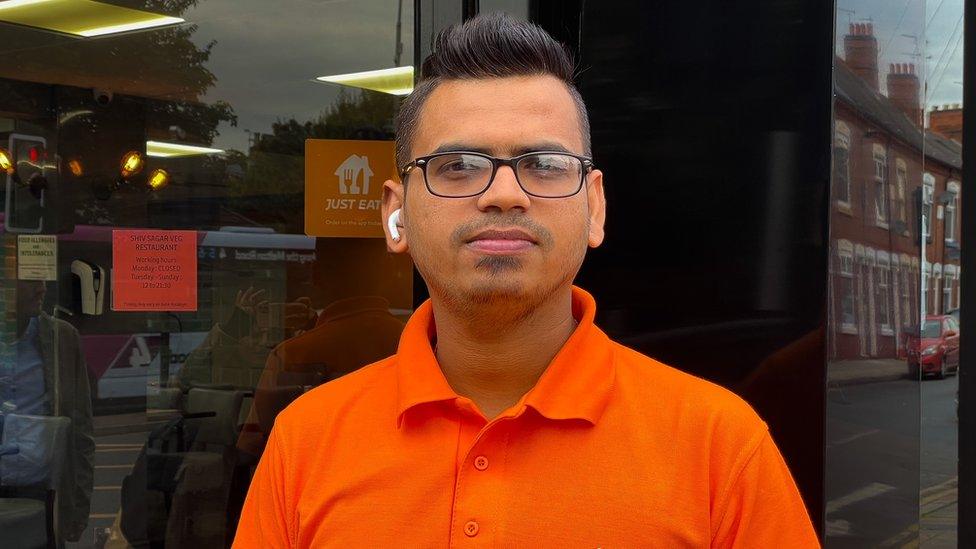
Restaurant manager Jay Patel says people have been cancelling their bookings
"People are not coming out. They're scared."
Jay Patel was running a busy dinner service at his vegetarian restaurant, Shiv Sagar, on Leicester's famous Golden Mile, on Saturday night. The dining room was packed with about 80 customers - couples, families, even a local councillor - when suddenly, huge crowds of young men marched past.
It's estimated there were hundreds of men out that night. Most were masked and dressed head-to-toe in black - and some appeared to be armed. It was terrifying, Mr Patel tells me.
"People were running on this side, on that side, banging on the door… we closed all the lights and all the curtains," he says. "It was very scary."
Since then, customers have been calling Shiv Sagar to cancel their reservations - and when we go in, the dining room is almost completely empty. This is unusual, Mr Patel says - they've been open for four years and the restaurant would normally be busy at this time.
"People are cancelling their tables and saying, 'We don't want to come there because this is happening,'" he says. "People are usually coming in in groups of three and four - but now there are no people."
The weekend's unrest in Leicester was the culmination of several weeks of growing tension between parts of the Hindu and Muslim communities in the city. It reportedly began after a cricket match between India and Pakistan, at the end of August - and although India-Pakistan cricket matches are highly politically charged, one thing everyone I speak to in Leicester agrees on is none of this is about cricket. Whether the match inflamed existing tensions or served as an opportunity for outside instigators is now the subject of intense speculation.
A total of 47 people have been arrested, 20 at the weekend. Some have been sentenced for possession of weapons.
The fight has spilled online, too. Claims of attacks on people because of their religion have gone viral - though many are unverified and, in one case, confirmed by police not to have happened. On Wednesday, officers urged people not to share unverified claims on social media. Leicester Magistrates' Court heard one man sentenced for carrying a knife had been influenced by social media.
Footage shared by both Hindus and Muslims on social media, allegedly taken during the unrest in the past few weeks, shows groups from both sides - masked men banging on people's windows in Hindu-majority areas and pulling down religious decorations, and others marching down predominantly Muslim-populated streets, chanting: "Jai Shri Ram", a religious chant now commonly co-opted by far-right Hindu nationalist groups in India.
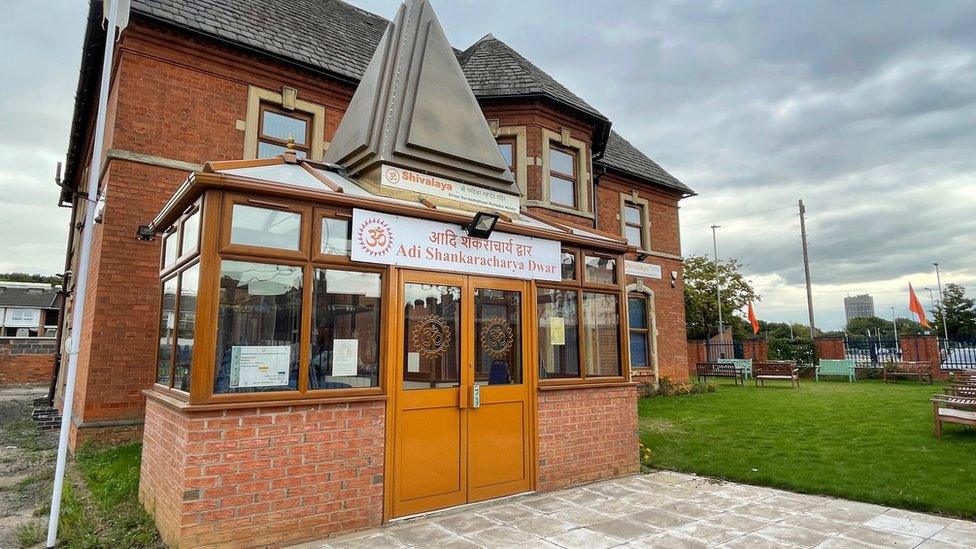
Footage showed a flag allegedly being pulled down from a Hindu temple, on Belgrave Road, and set alight
One video posted online shows a man climbing on to the roof of a Hindu temple, on Belgrave Road, and pulling down a religious flag. In another video, shared by the temple itself, on its Facebook page, a group of men set one of the temple's flags alight.
Those videos were allegedly filmed during the unrest on Saturday night - and even after a few days of calm, there's a fearful atmosphere in the area. When I visit the temple, the door is locked. A woman opens it for me but, once I introduce myself, I am told they're not speaking to the press and quickly ushered out. A charred flag hangs off the temple's fence.
Kishor Chauhan, who has owned Milans, a shop opposite the temple, for 45 years, says he's never seen anything like this in Leicester.
"It was really intimidating," he says. "This is the first time we've had something like these kind of racial riots."
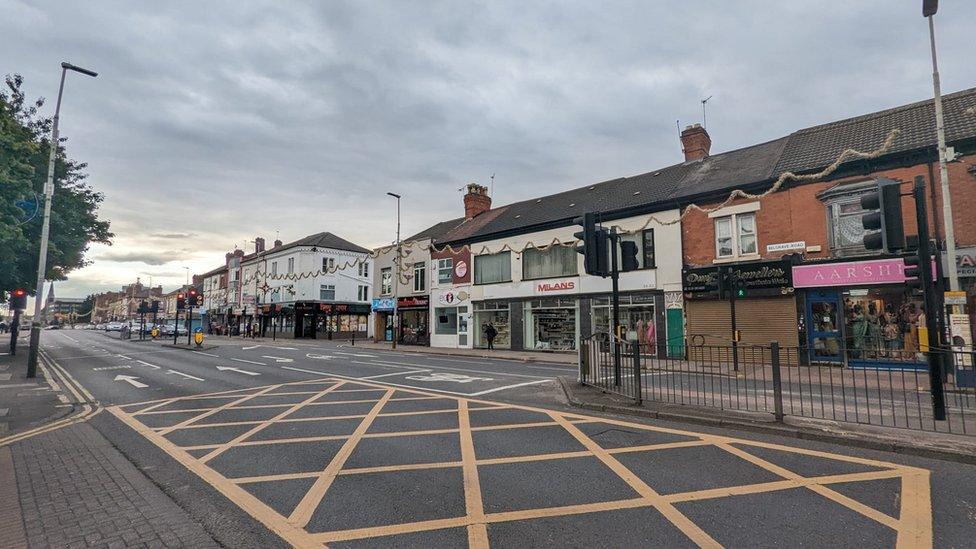
Kishor Chauhan has owned his shop Milans, on Belgrave Road, for 45 years
Hindu festivals are usually a busy time for Mr Chauhan, and for other businesses on the Golden Mile - but he worries the unrest will stop people coming to the area. The nine-day festival of Navaratri begins next Monday and Diwali is on 24 October.
"I hope that the communities now begin to understand and stamp it down, because if this continues throughout the [festival] season, business will be disrupted," Mr Chauhan says. "But more than the business side, if people from outside Leicester get scared to come to Leicester, then Leicester will lose its charm that it's had. It has always attracted a lot of people from outside."
Conflict between parts of the Hindu and Muslim communities is common in India, where there are longstanding tensions.
Recent years have seen a particular increase in factional unrest and hate crimes against religious minorities and there have been fears among minority communities and human-rights groups the problem has worsened under the rule of the Hindu nationalist Bharatiya Janata Party (BJP). In a report released last year, Human Rights Watch warned since the BJP came to power in 2014 it had "taken various legislative and other actions that have legitimised discrimination against religious minorities and enabled violent Hindu nationalism".
In February 2020, 53 people were killed in communal violence in Delhi, 40 of whom were Muslim, following weeks of peaceful protest against a new citizenship law demonstrators feared would target Muslims. And in February 2002, more than 1,000 people were killed during three days of anti-Muslim riots in the Indian state of Gujarat - one of the worst outbreaks of violence since independence.
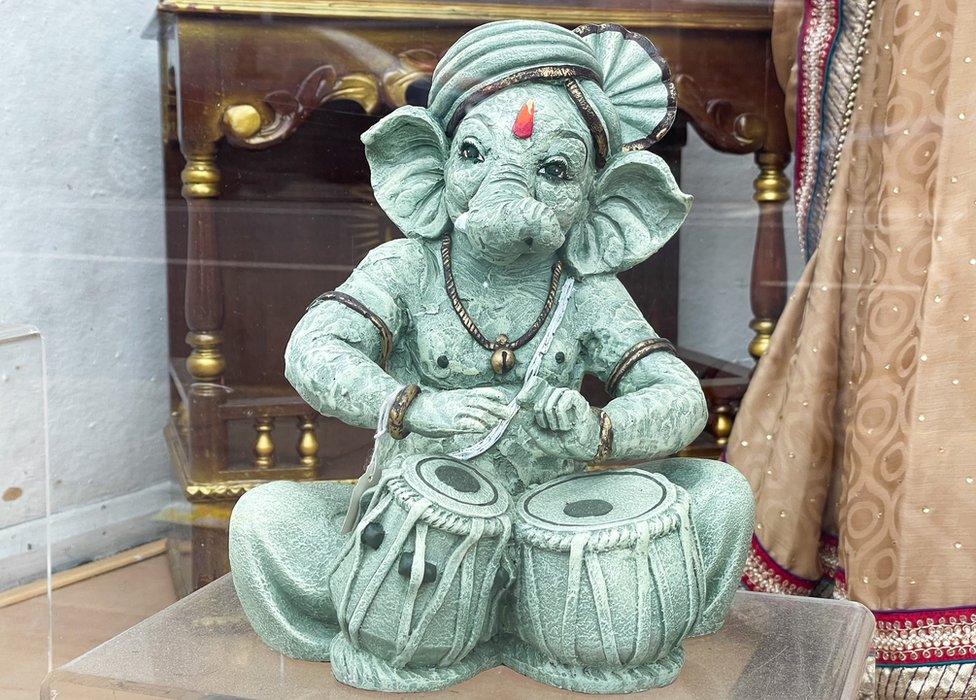
Mr Chauhan says he has never seen disorder between Hindus and Muslims in Leicester before
This has raised questions about whether outside influences were involved in the violence. According to Leicestershire Police, a significant number of those arrested in the disorder were not from the city. On Monday, Temporary Chief Constable Rob Nixon said they had seen "a group of people from other cities come to our city to disrupt and cause harm". Some activists speculate Hindu nationalist groups from India are also involved.
Violence between Hindus and Muslims is extremely rare in the UK - especially in Leicester, which is known for its particularly strong sense of cohesion. There's long been solidarity between Hindus and Muslims in the UK, as two diasporic minority communities that, in Britain, face similar problems of racism and discrimination.
In a joint statement delivered on the steps of Leicester's Jame Masjid mosque, on Tuesday, community leaders from both faith groups stressed this point.
"Our two faiths have lived harmoniously in this wonderful city for over half a century," they said. "We arrived in this city together. We faced the same challenges together. We fought off racist haters together, and we collectively made this city a beacon of diversity and community cohesion."
They were "heartbroken", they said, adding: "Physical attacks on innocent individuals and unwarranted damage to property are not part of a decent society and, indeed, not part of our faiths. What we have seen is not what we're about."
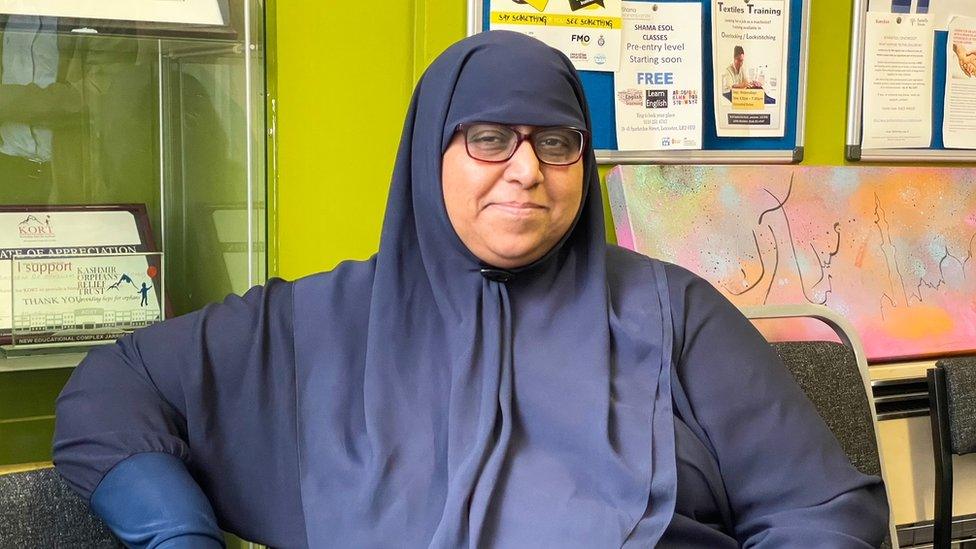
Yasmin Surti says the idea of community leaders having significant influence is outdated
Yasmin Surti, from the Federation of Muslim Organisations in Leicester (FMO), tells me part of the problem is the idea community leaders have significant influence is "ancient".
"We need to have dialogue and clearly we need to reflect on how we reach these young people who may not be in touch with the elders in mosques and temples," she says, adding there will be "a lot of learning" ahead.
Majid Freeman, a local fund-raiser for causes in the Middle East, said he is angry about what he regards as a lack of police action - "it was a riot waiting to happen."
He said there were many questions amongst the community about the police response to the protest on Saturday.
However, Temporary Chief Constable Rob Nixon Mr Nixon has said the police are "working to keep you safe and to arrest and bring to justice those that are causing harm in our communities".
Even at the height of the violence, though, there were glimpses of the unity Leicester is known for, according to Mr Patel. As crowds of masked men surrounded Shiv Sagar on Saturday night, a Muslim community leader came in to safely escort the largely Hindu clientele out of the restaurant to safety.
"One of the guys from the Muslim community - I don't know his name - but he came in and then, one by one took, each family and went with them to drop them off," Mr Patel says. "He said, 'If you want to go outside, then this is my priority.' And the customers went out with him one by one."
- Published20 September 2022
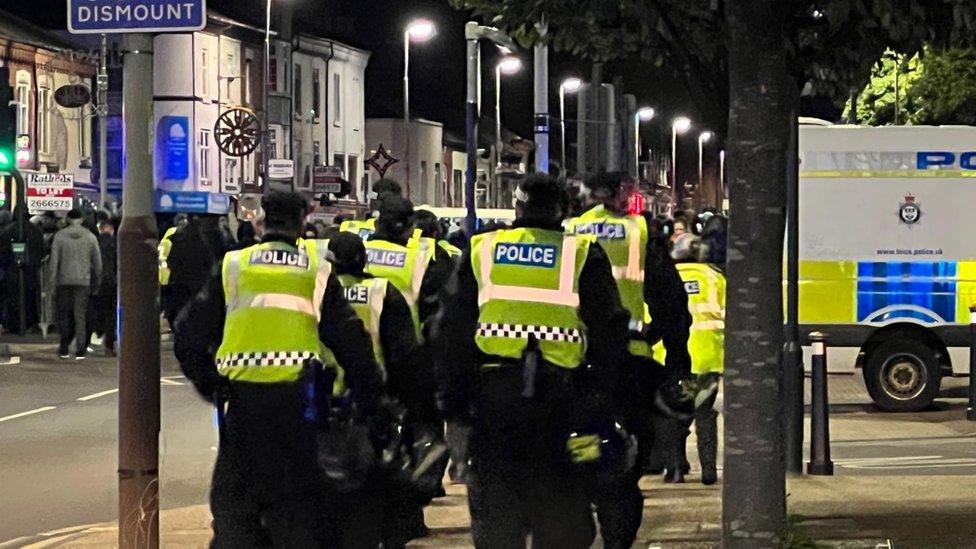
- Published19 September 2022
